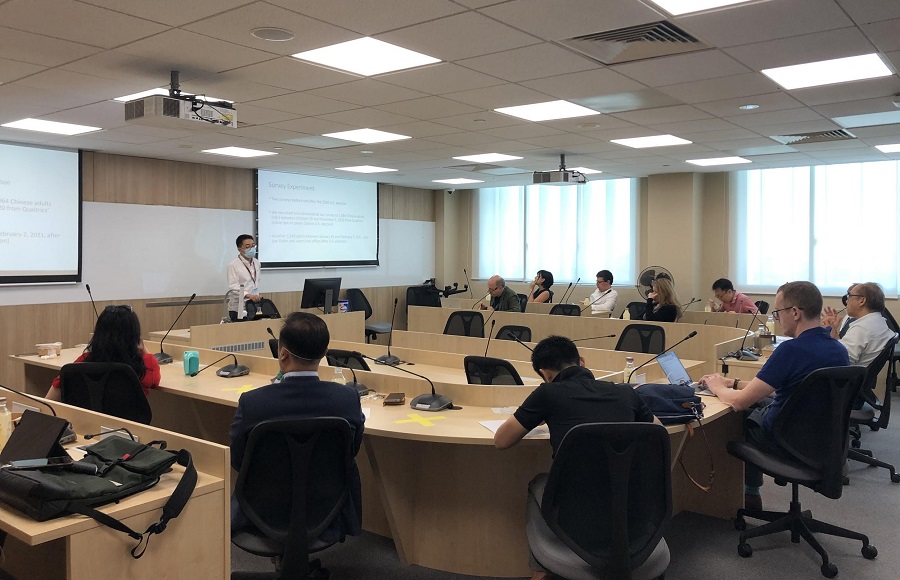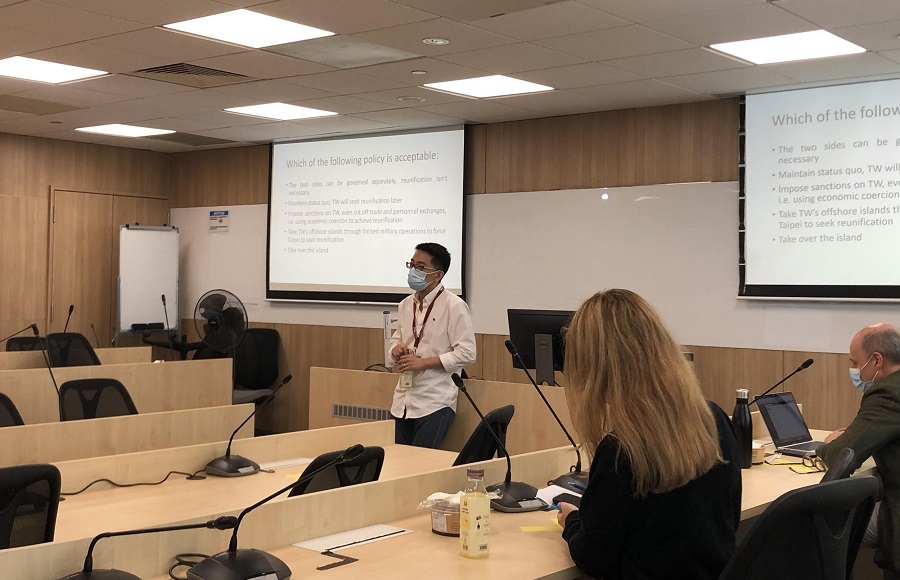
On March 18, 2021, Assistant Professor Adam Y. Liu presented on his work in progress tentatively titled “Reunification by Force? A Study of Chinese Public Opinion”. The presentation was followed by a short Q&A session with the attendees. The following are some key points made during the presentation.
- Public opinion matters in autocracy. Even without elections, autocrats are highly conscious of public opinion and still have the incentive to carry out foreign policies aligned with public opinion. As Chairman Mao Zedong said, “When you make revolution, you must first manage public opinion.” President Xi Jinping has a similar view of public opinion. He stated in 2013 that “winning or losing public support is an issue that concerns the CCP’s survival and extinction.”
- Currently, there is only one existing study of Chinese public opinion on reunification by force. This research was conducted by Pan et al. in 2017 based on data from 2013 while President Ma Ying-jeou was still in power. The result shows that only 6% mainland Chinese supported reunification by force, while more than 80% supported peaceful negotiations. However, the research focused solely on ten large cities and did not introduce experimental conditions.
- Liu’s research introduced two parameters in an experimental setting: the probability of US intervention and the probability of China winning (successfully take over Taiwan).
- While Liu’s theoretical expectation is that the Chinese would be more aggressive when being told that China has military advantage, the finding shows otherwise; military advantage (high probability of China winning + low probability of US intervention) does not push the Chinese to choose immediate reunification by force in Tsai’s second term (2020-2024), in fact, it has the opposite effect.
- Before the 2020 US election, about 20% of Chinese people accept the two sides can be governed separately, and reunification is not necessary in Tsai’s second term. Other than that, about 50% of Chinese people find different policy choices tolerable. These policy alternatives are maintaining the status quo, applying economic sanctions, limited military operations and military reunification. In other words, these policy alternatives are almost equally acceptable to the majority of Chinese people in the next four years, meaning that there are more policy spaces for the Chinese government to maneuver.
- After the 2020 US election, under the Biden administration, about 30% of Chinese people accept the two sides can be governed separately, and reunification is not necessary. This might be because Trump played the Taiwan card more aggressively than usual, so people became less tolerant of Taiwan's autonomy.
- Another point worth noting is that when US intervention is low and China winning is high, fewer people accept using force under the Biden administration. One of the possibilities is that people might think China can use more peaceful means to deal with this matter rather than using force.

The following points were made during the Q&A session.
- The literature suggests that as tensions rise between countries, the public becomes more supportive of government policies. Under the Ma Ying-jeou administration, cross-strait tensions were relatively eased, with only 6% of the public opinion supporting Taiwan's reunification. The baseline changed over time. Under the Trump administration, acceptance of the two sides' separate governance was lower than under Biden. This implies that US intervention could lead to a backlash from Chinese public opinion and greater support for reunification.
- In fact, Biden has become even more committed to helping Taipei. Biden has elevated the Six Assurances to the same status as the three joint communiqués, affirming US intention to deepen ties with Taipei and strengthening its "rock-solid" commitment to the self-governing democracy.
- 2035 seems to be the year that President Xi hopes to achieve major goals. The National Comprehensive Transportation Network Plan, jointly released by the Chinese Communist Party and the Chinese government in early March, shows the transport network reaching across the Taiwan Strait all the way to Taipei. This information may mean that they have to achieve some form of reunification in order to complete the railway construction plan within the time frame before 2035.
- Reunification is part of Xi Jinping’s China dream. In his speech in 2019, he said that the Taiwan question became a question because China was weak, and there has to be an end to this question because China is now strong. Given his ambitions, he will try to put a period to this historical question.
This event was covered by Jassie Cheng, Research Associate at the Centre on Asia and Globalisation, Lee Kuan Yew School of Public Policy.